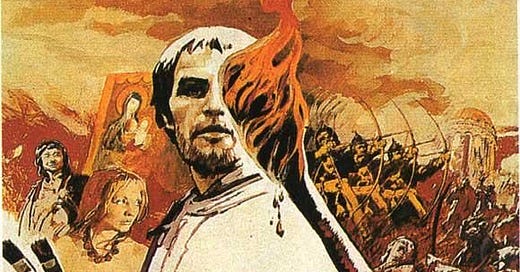In our circles on the right, film analysis and critique are a widespread hobby. There is especially a view that we can parse what the current elites are thinking about, and what issues they are trying to sell to the population by the artistic endeavors produced by them. A lingering question, therefore, is what form of art will be produced which signifies a thaw in elite enthusiasm for their cause?
The historic movie reputed to signify this thaw in the Soviet Union is Andre Rublev. Even though it was apparently given only limited release, and censored in the USSR when it was available, it arguably represents the formation of a cultural counter-elite within the USSR. It offered a voice which was counter to many of the official Soviet doctrines. The most obvious and surprising thing is how religious the film is. To get a glimpse of this you can view the ending here. How could it even have been made in a totalitarian, officially atheist state? Even under limitations and censorship, how could it have been allowed by the authorities to be seen by members of the public? There’s a feeling of longing for something different, a question of “how long can this nonsense go on for?” present in the film. At over three hours long, the audience too ponders the same question throughout.
For these reasons Andre Rublev should be considered as a truly “dissident” artform in a soviet context. Other than the sheer religiosity and Christian undertones, there is also something in the storyline which opposes the egalitarian ideals of leftism. The tension between Christian and recently “converted” Pagan is also something which crops up, which I found fascinating. But more to the point, the most interesting subtle critique of Soviet communism and all forms of leftism is the story of the bell maker Boriska. Boriska is a young man, still a child really, who undertakes the take of casting a gigantic bell for a cathedral. This is the most poignant and enthralling section of the movie, symbolizing the twentieth century and the fiery heat of industry made manifest in that century. Boriska, as it turns out, undertook this endeavor not having any special knowledge or training from his bell-maker father at all. He went into it totally blind, duping his way into it, only guided by something which was not visibly displayed in the film. His talent, as it turned out, was inherent to him and him alone. He knew which materials were proper and what the proper process was to create that bell. He was superior in his skill either genetically, or if you prefer, guided by divine power. This is the true meaning of the film. How absolutely yet subtly against any notion of equality! You can see for this reason why it was suppressed by the Soviets.
But what of us? Which films do we have today which express similar feelings and thoughts? There are a few films and shows which can be pointed to as a cultural turn towards the right, or explicitly against or making fun of bolshevism. They are: Chernobyl, Mr. Jones, The Death of Stalin, Hail Caesar!, Dune, and The Northman. Whilst these movies are all excellent, this list is not comprehensive. Which one of these cultural sources has the same impact as Andrei Rublev?
As audience members probably could guess, The Northman is my choice. A scathing critique of modern progressive sensibilities on a variety of levels, starting with its inherent rejection of an effeminate Longhouse imposing excessive risk aversion on everyone. It has an historically accurate all-white cast, and portrays the reality of white slavery contra current regime views on the subject. It has a female antagonist who is shown to be a betrayer of kin and a psychotic. No Mary-Sue girl-bosses in that film. The necessity of honoring the ties of blood, the fact that magic is real in the setting of The Northman, et cetera, all point to a vastly different vision of reality than we have now. Is there any progressive piety which it does not violate?
To return to the film Andrei Rublev, it’s a film which was initially released during the height of the Cold War. It was a full twenty-five years after release before the USSR finally collapsed. We should be prepared for similar timelines. What matters is the formation of a cultural counter-elite which challenges the current leadership on all levels, but especially morally and aesthetically. We should be aware of such people and, if possible, find out if they can be useful.




Andrei Rublev is a great film. I'll have to rewatch it.
Check out discussion of this film and its maker, Tarkovsky, at
https://www.youtube.com/channel/UCoHIvSV9beIc0ioeqGoQ-Fw
His son features prominently in these discussions.